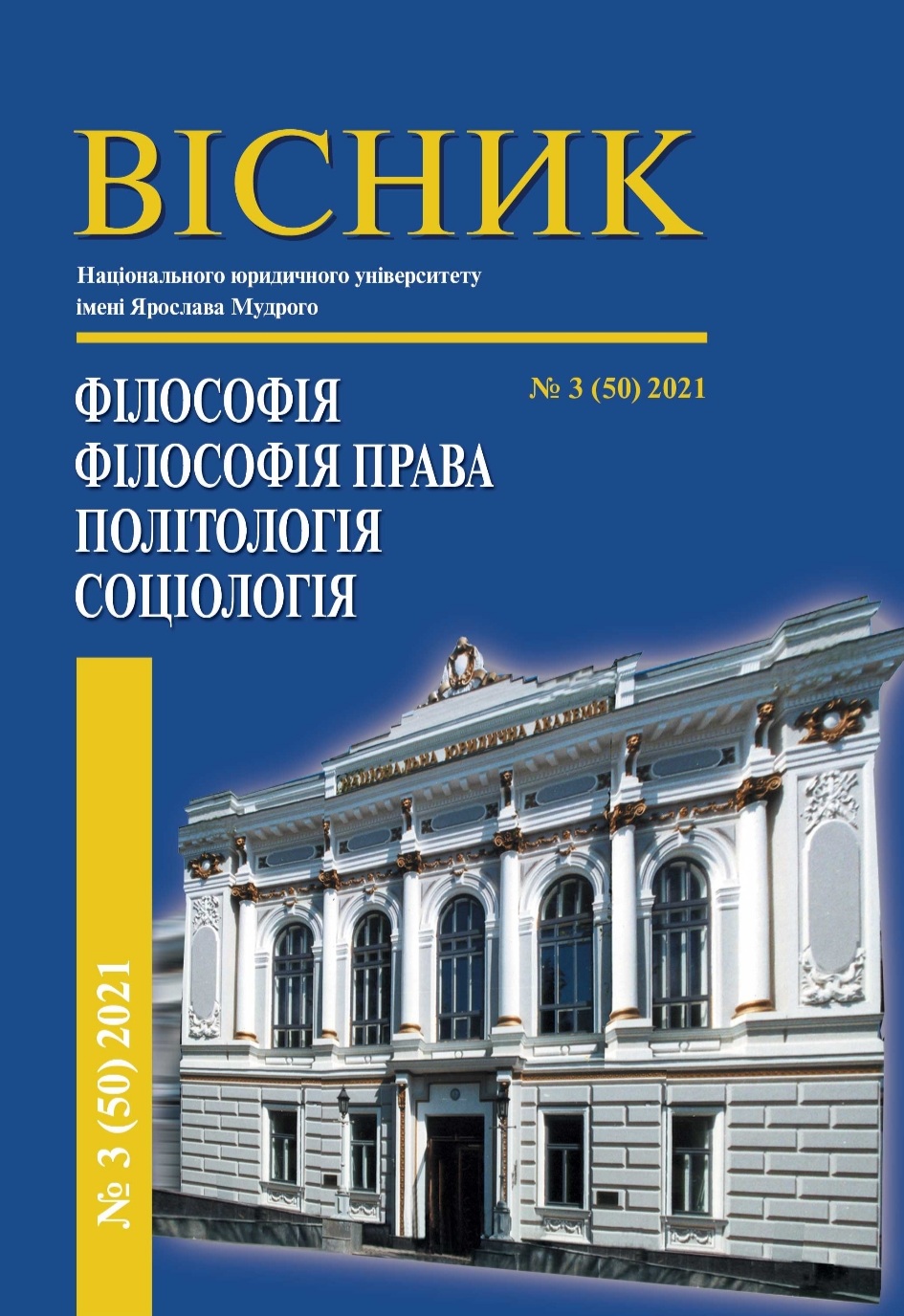МІФ ЯК ЗАСІБ РЕГУЛЯЦІЇ СУСПІЛЬНО- ПОЛІТИЧНИХ ВІДНОСИН В УМОВАХ ІНФОРМАЦІЙНОЇ ВІЙНИ
DOI:
https://doi.org/10.21564/2075-7190.37.133430Ключові слова:
міф, соціально-політичний міф, міфологізація, інформація, інформаційна війнаАнотація
Розкрито зміст поняття «соціально-політичний міф», визначено його функції та вплив на формування індивідуальної та масової свідомості. Доведено, що в умо- вах інформаційної війни міф може перетворюватися на небезпечну зброю, яка вражає не на фізіологічному, а на ментальному рівні, породжуючи почуття нена- висті, ворожості, відчаю. Наголошено на значенні засобів мас-медіа та Інтернет- ресурсів у процесі створення та розповсюдження соціально-політичних міфів.
Посилання
Trebin, M. P. ed. (2015). Politolohichnyi entsyklopedychnyi slovnyk / uklad.: [L. M. Herasina, V. L. Pohribna, I. O. Polishchuk ta in.]. Kharkiv: Pravo [in Ukrai- nian].
Danylian, O. H., Dzoban, O. P. (2017). Hlobalizatsiia kultury: protyrichchia ta tendentsii rozvytku. Visnyk Natsionalnoho universytetu «Iurydychna akademiia Ukrainy imeni Yaroslava Mudroho». Seriia: politolohiia – Bulletin of the National University «Yaroslav the Wise Law Academy of Ukraine». Series: Political Science, 2 (33), 29-41 [in Ukrainian].
Chowdhury, A. (2018). The myth of international order: why weak states persist and alternatives to the state fade away. New York : Oxford University Press.
Conrad, P. (2016). Mythomania: tales of our times, from Apple to ISIS. New York, NY: Thames & Hudson.
Faivre, D. l’ed. (2016). De l’acte fondateur au mythe de fondation : une approche pluridisciplinaire. Paris: L’Harmattan.
Evans, A. (2017). The myth gap: what happens when evidence and arguments aren’t enough? / foreword by Tim Smit. London: Eden Project Books.
Fallon, D. J. (2017). Blake, myth, and enlightenment: the politics of apotheosis. London: Palgrave Macmillan.
Fimi, D. (2017). Celtic myth in contemporary children’s fantasy: idealization, iden- tity, ideology. London: This Palgrave Macmillan imprint is published by Springer Nature.
Houze, R. (2016). New mythologies in design and culture: reading signs and symbols in the visual landscape. London; New York: Bloomsbury Academic.
Lewis, L. (2016). The myth of post-racialism in television news. New York; London: Routledge, Taylor & Francis Group.
Miller, D. D. (2016). The myth of normative secularism: religion and politics in the democratic homeworld. Pittsburgh: Duquesne University Press.
Miller, L. L. (2016). The myth of mob rule: violent crime and democratic politics. New York, NY: Oxford University Press.
Guevara, B. B. de (2016). Myth and narrative in international politics: interpretive approaches to the study of IR. London: Palgrave Macmillan.
Ham, C. van, Thomassen, J., Aarts, K., Andeweg, R. eds (2017). Myth and reality of the legitimacy crisis: explaining trends and cross-national differences in established democracies. Oxford; New York: Oxford University Press.
Dobre, C.-F., Ghita, C. E. eds (2017). Quest for a suitable past: myth and memory in Central and Eastern Europe. Budapest; New York: CEU Press, Central European University Press.
Reinbold, J. (2017). Seeing the myth in human rights. Philadelphia: University of Pennsylvania Press.
Robinson, C. J. (2016). The terms of order: political science and the myth of leadership
/ foreword by Erica R. Edwards. Chapel Hill: The University of North Carolina Press.
Samuels, R. (2018). Educating inequality: beyond the political myths of higher education and the job market. New York: Routledge, Taylor & Francis Group.
Sand, S. (2017). Twilight of history / translated by David Fernbach. London; Brooklyn, NY: Verso.
Szczesiul, A. (2017). The Southern hospitality myth: ethics, politics, race, and American memory. Athens: The University of Georgia Press.
Taylor, I. (2017). Global governance and transnationalizing capitalist hegemony: the myth of the «emerging powers». London; New York: Routledge, Taylor & Francis Group.
Zakariya, N. (2017). A final story: science, myth, and beginnings. Chicago; London: The University of Chicago Press.
Zoja, L. (2017). Paranoia: the madness that makes history / translated by Jonathan Hunt. London; New York: Routledge, Taylor & Francis Group.
Losev, A. F. (2008). Dialektika mifa. Moskva: Akademicheskiy Proekt [in Russian].
Eliade, M. (1995). Aspektyi mifa / per. s fr. V. Bolshakov. Moskva: Invest-PPP [in Russian].
Kutsepal, S. V. (2016). Politychnyi mif: versiia Rolana Barta. Hileia: naukovyi visnyk. Zbirnyk naukovykh prats – Gilea: Scientific Bulletin. Collection of scientific works, issue 112 (9), 109–111 [in Ukrainian].
Bart, R. (1989). Izbrannyie rabotyi: Semiotika: Poetika / per. s fr. G. Kosikova. Moskva: Progress [in Russian].
Trebin, M. P. (2014). «Hibrydna» viina yak nova ukrainska realnist. Ukrainskyi sotsium – Ukrainian Society, 3(50), 113–127 [in Ukrainian].
Tsymbal, T. V. (2012). Fenomen emihratsii: dosvid filosofskoi refleksii. Kyiv, Kryvyi Rih: Vydavnychyi dim [in Ukrainian].
Tsuladze, A. (2003). Politicheskaya mifologiya. Moskva: «Eksmo» [in Russian].
Trebin, M. P. (2014). Fenomen «hibrydnoi» viiny. Hileia: naukovyi visnyk. Zbirnyk naukovykh prats – Gilea: Scientific Bulletin. Collection of scientific works, issue 87 (8), 366–371 [in Ukrainian].
Kozhemiakina, O. M. (2018). Komunikatyvni determinanty mediadoviry v suchas- nomu informatsiinomu suspilstvi. Hileia: naukovyi visnyk. Zbirnyk naukovykh prats – Gilea: Scientific Bulletin. Collection of scientific works, issue 129 (2), 179–184 [in Ukrainian].
Trebin, M. P. (2013). Fenomen informatsiinoi viiny u sviti, shcho hlobalizuietsia.
Visnyk Natsionalnoho universytetu «Iurydychna akademiia Ukrainy imeni Yaroslava Mudroho». Seriia: Filosofiia, filosofiia prava, politolohiia, sotsiolohiia – Bulletin of the National University «Yaroslav the Wise Law Academy of Ukraine». Series: Philosophy, Philosophy of Law, Political Science, Sociology, issue 2 (16), 188–198 [in Ukrainian].



